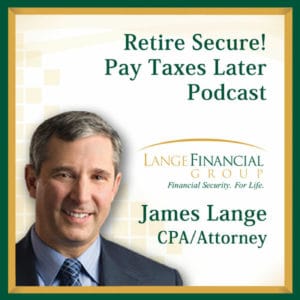Click here to listen to this snippet.
Jim Lange: Alright, so let’s get into the basics. I say ‘a trust’, what am I talking about? Well, it’s basically an agreement or a contract, if you will, where a trustee administers your assets in accordance with your wishes. And this trust can be funded while you’re alive. Basically, that is called a revocable trust, revocable, meaning that you can change it whenever you feel like it. Some people call that a living trust. You can be your own trustee. So you can say “Okay, I’m going to set up the…” maybe I shouldn’t call you the Joe Schmo trust, but let’s say your name is Joe Schmo, you can set up the Joe Schmo trust and named Joe Schmo is the trustee, or if it’s Joe and Jane Schmo, you could have a joint revocable trust. And you could have Joe and or Jane or both of you, as the joint trustees of the Joe and Jane revocable trust.
Or you could set up a testamentary trust. “At my death,” this is usually done through a will. But “at my death, this, this block of money goes into this trust, and here are the terms of the trust, whatever they might be, a trust can be.” And again, if you have by the way a revocable trust, you don’t only name yourself as the trustee. And typically you give yourself the power to do anything you feel like, but you also say what happens to the money that is controlled by the trust after your death. And if you’re married after the first step, and after the second death, the trust can be revocable, revocable is you can change it. And I’m gonna say probably 98% of the trusts that we draft are revocable, you can also have an irrevocable trust, an irrevocable trust is a trust that you can’t change. Why would you even want to do an irrevocable trust? You might want to make sure that the assets that you placed in that trust are not included in your estate. And if you look, so let’s say for discussion sake, you set up a trust for your children. And, and I’ll even use a million dollars.
Jim Lange: So you’re interested in making a million dollars. By the way, this is a very, very well not that common but something that we do do. You want, you want a million dollars to go to your kids, you don’t need the income from that million dollars. In fact, you don’t even want that million dollars in your state when you die, you want to avoid both federal and state or state inheritance or estate taxes that might be leveled by a state. So what you can do, on the other hand, if you give a million dollars to your kids outright, then they could do whatever they want with it. And that they might blow it, they might do something stupid, they might, that money would be subject to creditors. And that might reduce their motivation to work hard and succeed in life. So you might not want to give them a million dollars outright, you might want to create an irrevocable trust, where you have no income from it, you have no powers over, and other than you’re the trustee. Or even you’re not the trustee, actually. You transfer that money, the money’s outside your state. And if you change your mind afterward, too bad. But again, the advantage of that is it is outside your estate. It is also relatively common to have an irrevocable trust, known as an islet, which is an irrevocable life insurance trust. So let’s say that you have some life insurance, and you want your kids to be the beneficiaries of that life insurance. And you want them obviously to get it after you or if you get a second to die policy, after you and your spouse are gone.
Jim Lange: And you don’t want to own that life insurance if you own the life insurance. That gives you the power to change the beneficiaries. But let’s say you don’t need the power to change the beneficiaries. You can create an irrevocable trust, you make gifts to the trust, then the trust uses that money to pay the premium. And then as the euphemism that the insurance guys use is when the policy matures, then whatever the death benefit is goes to your kids according to the terms of the trust and these trusts basically all of them that I have been talking about, allow you to control the disposition of your money after your death and a lot of people both need that. A lot of people want that and that is what we are going to be talking about today.
Join Jim Lange LIVE on September 28th and 29th for his FREE two-day virtual events!
Click here to reserve your seat!

